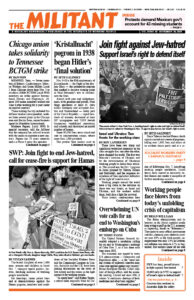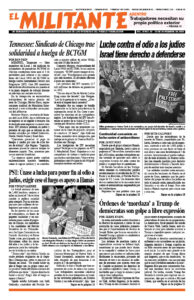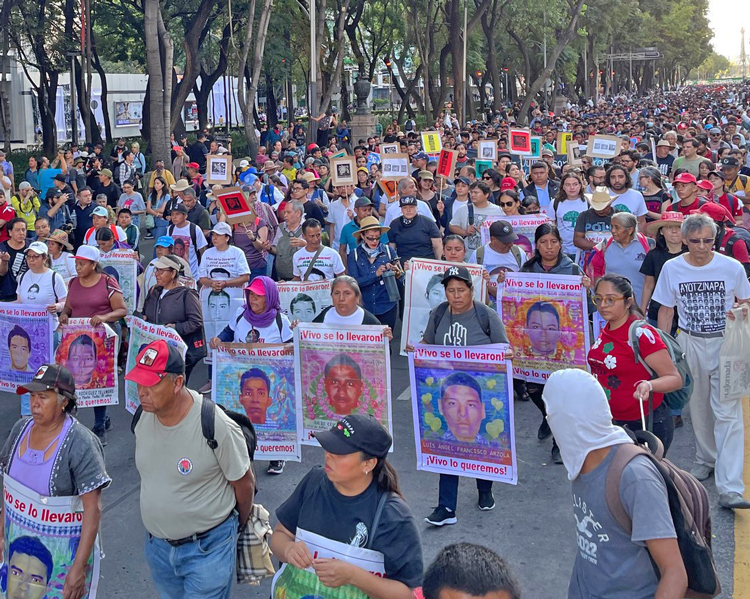Nine years after the 2014 kidnapping and disappearance of 43 protesting students from Ayotzinapa by powerful drug cartels acting in collusion with the Mexican military and police, their relatives and supporters continue to protest and demand answers from the government about the whereabouts of the students or their bodies.
“The army knows it,” was a prominent slogan and banner at the Sept. 26 march to the Zocalo Plaza, in front of the National Palace. Thousands took part to condemn the complicity of Mexican authorities in an atrocity that has sparked broad outrage.
Last July the Interdisciplinary Group of Independent Experts (GIEI), a panel invited by the Mexican government to conduct an investigation, presented a report concluding commanding officers of the Mexican army, navy, police and intelligence agencies were all complicit in the 2014 abduction, and had concealed information about where some of the youth had been taken.
The brutal act began Sept. 26, 2014, when municipal police opened fire on buses that the 43 students were riding in, killing three of them. Cops then handed over the survivors to a drug cartel. The trainee teachers were from a rural college in Ayotzinapa and had “commandeered” the buses, a traditional practice in student protests that is largely tolerated, and had never before been met with lethal force by authorities. The students intended to travel to Iguala, in the southern state of Guerrero, to protest against discriminatory hiring practices for teachers.
A trove of 23,000 text messages intercepted by the U.S. Drug Enforcement Administration in 2014 was published in the New York Times this September. The messages reveal the scope of collusion between drug bosses and government authorities at all levels, down to a city coroner.
Police commanders whose officers kidnapped the students had been taking direct orders from drug bosses who believed rival gangs were using the buses. The abduction happened while army commanders — also on the payroll of the cartels — and military intelligence officers were receiving constant updates from informants without making any attempt to rescue the students, reported the Times.
What followed their disappearance is a sweeping cover-up under the previous government of Enrique Peña Nieto and continued by current President Andrés Manuel López Obrador, known as AMLO. No one has been convicted of the crime.
Charges against dozens of suspects have been dismissed because their confessions were obtained under torture. The GIEI announced in July it was suspending its work after persistent stonewalling from the armed forces and government prosecutors. Late last year a prosecutor who led the case against soldiers’ accused of the killings fled the country, saying he fears for his safety.
AMLO protects army brass
“We regret that AMLO’s response was to stand for that institution [the army], and not to stand for truth and justice,” Emiliano Navarrete, the father of one of the missing students, told the press Sept. 25. A group of parents met with the Mexican president five days earlier to demand that army commanders release all information they have about the case.
“As parents, we will continue in this struggle,” said Joaquina García. He was interviewed at an encampment set up by the students’ relatives and their supporters in front of Military Camp 1-A in Mexico City.
López Obrador has defended the military command, claiming it is “incorruptible” and calls the army, “the people in uniform.” He tries to cover up the real character and main function of the army under capitalism — to protect the ruling families and repress working people. The fact that the majority of the army’s ranks are from the working class doesn’t change that. That has been true under every administration.
The repressive record of Mexico’s police and armed forces is impossible to hide, no matter how much the López Obrador government tries. This is true whether the issue is the shooting dead of unarmed students protesting state violence in Tlatelolco in 1968; to the “Dirty War” against trade unionists, peasants and students in the following two decades; to the most recent daily atrocities committed as part of the drug war.
Last June, students from the Mactumactzá teachers rural college in Tuxtla Gutierrez, Chiapas, and their supporters held a protest in Mexico City to demand authorities drop arrest orders issued against 95 students for blocking a road toll booth as part of protests in 2021. Demonstrators were demanding that placement tests to get into the school be done in person on campus and not online, because the majority of applicants come from rural and indigenous areas and do not have easy access to the internet. The arrests have provoked further protests by students, trade unionists and indigenous organizations.


